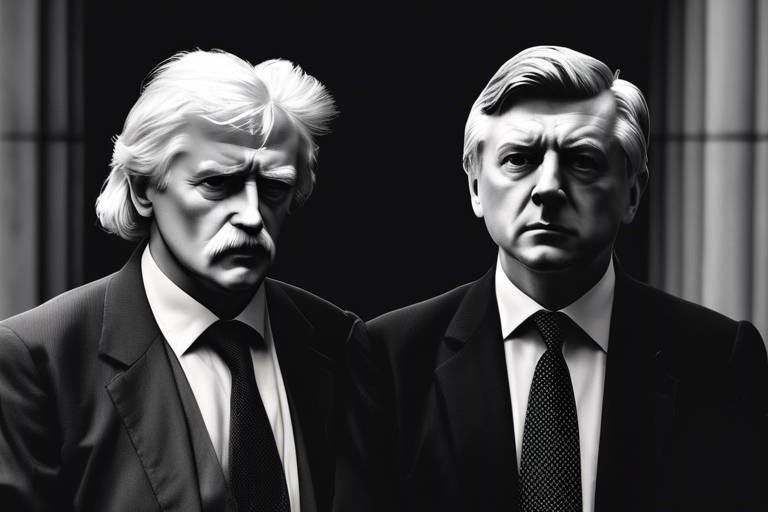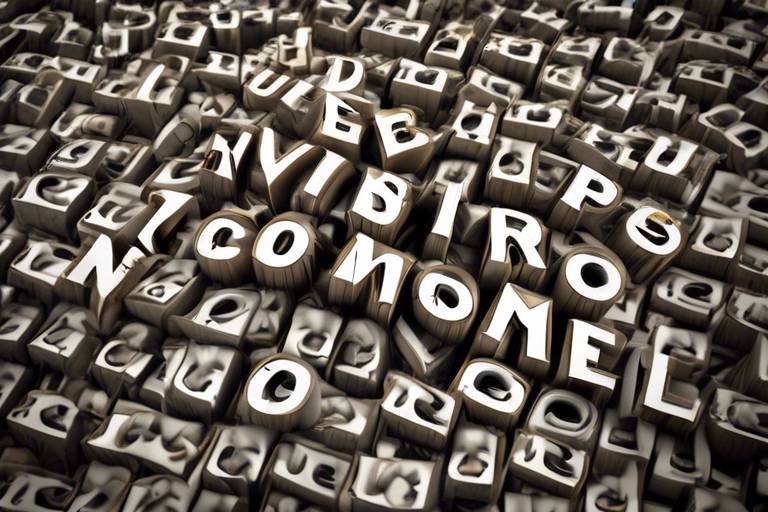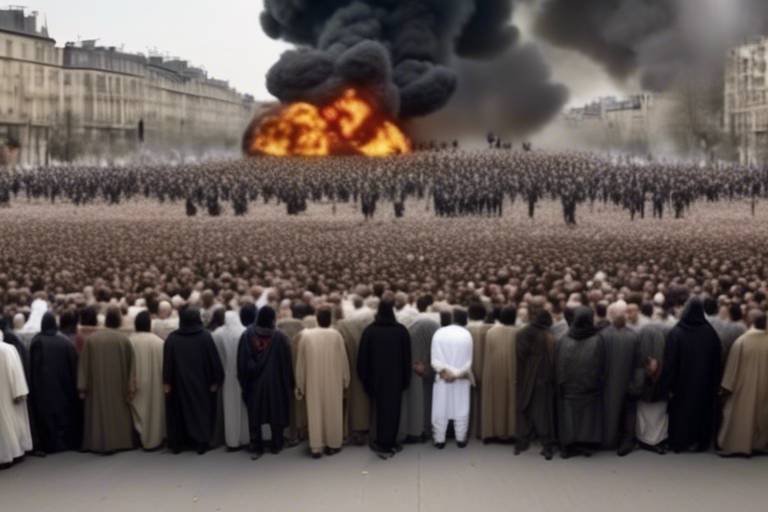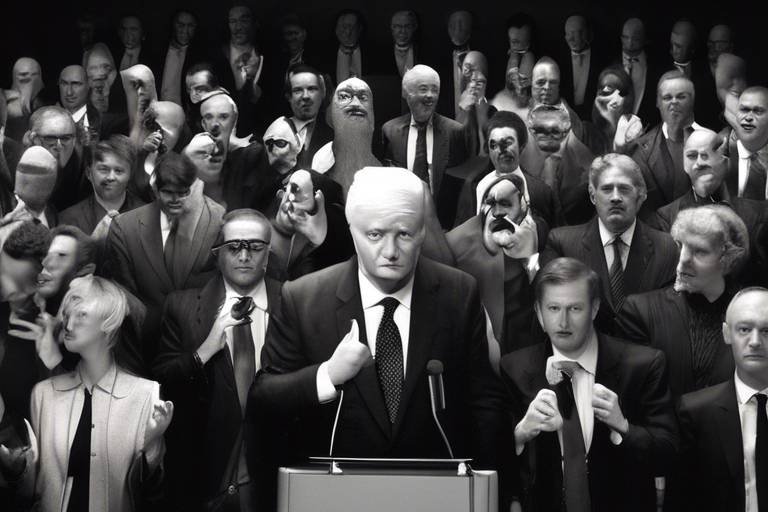Political Philosophy: Hobbes vs Locke
The realm of political philosophy is a fascinating landscape filled with diverse ideas and theories that have shaped human governance over centuries. Among the most influential thinkers in this field are Thomas Hobbes and John Locke, whose contrasting views on human nature and the role of government continue to echo through modern political discourse. Imagine two architects, each designing a blueprint for society based on their unique perspectives on what it means to be human. Hobbes, with his grim outlook, constructs a fortress of absolute authority, while Locke, with a more optimistic view, envisions a community built on mutual respect and individual rights.
Hobbes and Locke both grappled with the question of how humans should coexist in a society, but they arrived at radically different conclusions. Hobbes, writing in the context of civil war in England, believed that humans are inherently selfish and brutish, driven by a primal urge for self-preservation. He argued that without a powerful sovereign to maintain order, life would be "solitary, poor, nasty, brutish, and short." In stark contrast, Locke viewed humans as rational beings, capable of cooperation and altruism. He posited that individuals possess natural rights to life, liberty, and property, and that the primary role of government is to protect these rights.
This fundamental divergence in their views on human nature leads to distinct theories of the social contract. Hobbes' social contract suggests that individuals must surrender their rights to a sovereign authority in exchange for security and peace. This idea justifies a strong, centralized power—often an absolute monarchy—as the ideal form of governance. Locke’s social contract, however, emphasizes the importance of consent and individual rights, advocating for a government that derives its power from the people and exists to serve their interests.
As we delve deeper into their philosophies, it's essential to analyze how their views on authority shape their governance models. Hobbes' vision results in a system where the sovereign holds absolute power, while Locke’s model promotes a representative government governed by the rule of law. This distinction not only reflects their differing views on authority but also influences contemporary discussions about democracy, individual rights, and the role of government in society.
- What is the main difference between Hobbes and Locke's views on human nature?
Hobbes believed that humans are inherently selfish and brutish, requiring a strong authority to maintain order. Locke, on the other hand, viewed humans as rational and cooperative, advocating for a government that protects individual rights. - How do Hobbes and Locke differ in their social contract theories?
Hobbes' social contract involves surrendering rights to an absolute sovereign for security, while Locke's emphasizes consent and the protection of individual rights. - What impact have Hobbes and Locke had on modern political thought?
Both philosophers have profoundly influenced contemporary debates on democracy, individual rights, and governance, highlighting their enduring relevance in political discourse.

Hobbes' View of Human Nature
This article explores the contrasting political philosophies of Thomas Hobbes and John Locke, focusing on their views on human nature, government, and the social contract, which continue to influence modern political thought.
Thomas Hobbes, a 17th-century philosopher, had a rather bleak view of human nature. He believed that humans are fundamentally selfish and driven by their own desires, which often leads to conflict. To Hobbes, life in a state of nature—where no authority exists—would be chaotic and violent, akin to a war of all against all. In his famous work, Leviathan, he famously stated that in such a state, life would be “solitary, poor, nasty, brutish, and short.” This perspective paints a grim picture, suggesting that without a powerful, centralized authority, society would plunge into anarchy.
Hobbes argued that because of this inherent selfishness, individuals would willingly surrender their freedoms to a sovereign power in exchange for security and order. This concept of the social contract is pivotal in Hobbes’ philosophy. Here’s a breakdown of his views:
- Selfishness: Hobbes believed that humans act primarily out of self-interest.
- Conflict: He posited that without authority, humans would inevitably come into conflict over resources.
- Need for Authority: To escape this chaos, people must submit to a powerful ruler.
In Hobbes' view, the sovereign—be it a monarch or an assembly—must hold absolute power to maintain peace and prevent the descent into disorder. This leads to his justification of a strong government, as he believed that only through absolute authority could order be restored and maintained. You might wonder, how does this reflect on our modern governance? Well, it raises important questions about the balance between freedom and security.
Hobbes' philosophy suggests that the surrender of certain freedoms is a necessary compromise for the greater good of societal order. However, this raises ethical dilemmas. Is it justifiable for individuals to give up their rights for security? What happens when the authority becomes tyrannical? These questions continue to resonate in today’s political discussions, highlighting the delicate dance between authority and liberty.
In summary, Hobbes' view of human nature is one that necessitates a strong, central authority to prevent chaos. His ideas serve as a cautionary tale about the potential consequences of human selfishness and the importance of governance in maintaining social order.
- What is Hobbes' social contract theory? Hobbes' social contract theory posits that individuals give up certain freedoms to a sovereign in exchange for security and order.
- Why did Hobbes believe in absolute authority? He believed that without a strong ruler, society would descend into chaos and violence, necessitating absolute authority for peace.
- How does Hobbes' view of human nature compare to Locke's? While Hobbes viewed humans as selfish and brutish, Locke saw them as rational and capable of cooperation.

Locke's View of Human Nature
When we dive into John Locke's view of human nature, we step into a realm that contrasts sharply with the dark, pessimistic outlook of Thomas Hobbes. Locke believed that humans are not merely selfish creatures driven by base instincts, but rather rational beings capable of reason and cooperation. This fundamental belief in the inherent goodness and rationality of people is what sets Locke apart in the landscape of political philosophy. He viewed human beings as possessing natural rights to life, liberty, and property, which are essential to their existence and well-being.
Locke argued that individuals are born as a blank slate, or tabula rasa, and their experiences shape their character and decisions. This idea leads us to question: if people are inherently rational, can they not govern themselves? In Locke's eyes, the answer is a resounding yes. He emphasized that humans are capable of forming societies based on mutual respect and consent, which is a stark contrast to Hobbes' belief in the necessity of a powerful sovereign to maintain order. Locke's perspective encourages a vision of society where individuals come together to create a government that reflects their collective will, rather than one that imposes authority over them.
At the core of Locke's philosophy is the idea that the legitimacy of government arises from the consent of the governed. This notion is revolutionary because it places the power in the hands of the people rather than a monarch or dictator. Locke believed that when individuals enter into a social contract, they agree to form a government that protects their natural rights. If that government fails to uphold these rights, the people have the right to overthrow it—a concept that has fueled democratic movements throughout history.
Locke also recognized that while humans are capable of cooperation, they are not immune to conflict. He understood that disagreements could arise, which is why he advocated for a government that operates under the rule of law. This legal framework would ensure that everyone's rights are protected and that justice prevails. In Locke's view, the government should be a neutral arbiter, resolving disputes fairly and maintaining peace without infringing on individual liberties.
To summarize, Locke's optimistic view of human nature leads to a governance model that emphasizes individual rights, consent, and the rule of law. His philosophy encourages us to envision a society where individuals work together for the common good, fostering an environment where freedom and cooperation can flourish. In a world where Hobbes saw chaos and a need for control, Locke saw potential and the power of human rationality.
- What are the main differences between Hobbes and Locke?
Hobbes believed in a strong, absolute authority to prevent chaos, while Locke advocated for a government based on the consent of the governed, protecting individual rights. - How does Locke's view of human nature influence modern democracy?
Locke's belief in rationality and the importance of consent forms the foundation for democratic principles, emphasizing that governments should serve the people. - What role does the social contract play in Locke's philosophy?
The social contract is crucial in Locke's thought as it establishes the legitimacy of government based on the protection of natural rights.

Social Contract Theory in Hobbes' Philosophy
Thomas Hobbes' social contract theory is a cornerstone of his political philosophy, encapsulating his belief in the necessity of a powerful sovereign to prevent chaos. In Hobbes' view, the natural state of humanity is one of constant conflict and competition, where life is "solitary, poor, nasty, brutish, and short." This bleak outlook on human nature drives his argument for a social contract, where individuals willingly surrender certain freedoms to a central authority in exchange for security and order.
According to Hobbes, in the absence of a strong governing body, society would inevitably descend into a state of war, where every individual would act in their own self-interest. To escape this anarchic condition, people enter into a social contract, agreeing to transfer their rights to a sovereign who possesses the power to enforce laws and maintain peace. This sovereign could be an absolute monarch or an assembly, but the key point is that the authority must be undivided and absolute to effectively govern.
Hobbes outlines this theory in his seminal work, Leviathan, where he argues that the social contract is not merely a theoretical construct but a practical necessity. The contract implies that individuals consent to give up certain freedoms, such as the right to retaliate against wrongs, in return for the protection of their remaining rights. This creates a society where laws are established and enforced, ensuring that individuals can live without the fear of violence or theft.
To illustrate Hobbes' social contract, consider the following key points:
- Mutual Agreement: Individuals collectively agree to form a society and accept the authority of a sovereign.
- Transfer of Rights: People relinquish certain rights and freedoms to gain security and order.
- Absolute Authority: The sovereign must have the power to enforce laws and maintain peace without challenge.
This framework leads to Hobbes' justification for absolute authority. He argues that without a strong ruler, there would be no effective way to maintain order, and the social contract would break down, leading to chaos. In his eyes, the surrender of certain freedoms is a small price to pay for the stability and safety that a powerful sovereign can provide.
However, this raises important questions about the nature of authority and the rights of individuals. While Hobbes believed that absolute authority was necessary for peace, critics argue that such a system can lead to tyranny and oppression. The challenge lies in balancing the need for security with the preservation of individual freedoms, a debate that continues to resonate in modern political discourse.
In summary, Hobbes' social contract theory emphasizes the necessity of a strong, centralized authority to maintain order in a world where human nature is inherently self-interested. His ideas about governance and authority continue to provoke discussion and debate, highlighting the complexities of social contracts in both historical and contemporary contexts.

Absolute Authority and Its Justification
When we dive into the depths of Hobbes' political philosophy, we encounter a compelling argument for the necessity of absolute authority. Hobbes firmly believed that without a powerful sovereign, society would spiral into chaos. Imagine a world where everyone acts solely on their own interests, much like a pack of wolves fighting over the last piece of meat. This chaotic state, which Hobbes famously referred to as the "state of nature," is characterized by constant fear and insecurity, where life is "solitary, poor, nasty, brutish, and short." In such a scenario, the need for a strong ruler becomes not just a preference but a dire necessity.
Hobbes argued that individuals, in their quest for survival, would willingly surrender their rights to a sovereign in exchange for security and order. This concept of the social contract is fundamental to understanding Hobbesian governance. People, recognizing the futility of their own strength against the collective chaos, would agree to a contract that grants the sovereign absolute power. This ruler, whether a monarch or a governing body, is tasked with maintaining peace and preventing the descent back into anarchy.
To justify this absolute authority, Hobbes presented a compelling case: he asserted that the cost of freedom is often too high in a disordered society. The trade-off is simple yet profound: surrender a degree of personal liberty for the assurance of safety and stability. In Hobbes' view, this surrender is not only rational but essential for the preservation of society. Without such a strong figure to impose order, the natural instincts of humans would lead to conflict, war, and ultimately, destruction.
However, this notion of absolute authority raises significant questions about the nature of governance and individual rights. While Hobbes' argument emphasizes security, it also invites scrutiny regarding the limits of power. How much freedom are individuals willing to relinquish? What happens when a ruler's thirst for power eclipses the very security they promised? These questions highlight the delicate balance between order and liberty, a conversation that remains relevant today.
In essence, Hobbes' justification for absolute authority serves as a double-edged sword. It provides a framework for understanding the necessity of governance in a chaotic world, yet it also opens the door to potential tyranny. The implications of such governance models can be profound, leading to limited personal freedoms and a society where the individual is often overshadowed by the needs of the state. This tension between authority and individual rights continues to resonate in modern political discourse, reminding us that while security is vital, it should never come at the expense of our fundamental freedoms.
- What is Hobbes' view of human nature? Hobbes believed that humans are inherently selfish and brutish, which necessitates a powerful sovereign to maintain order.
- How does Hobbes justify absolute authority? He argues that without a strong ruler, society would descend into chaos, making the surrender of freedom a necessary compromise for peace.
- What are the implications of Hobbesian governance? The implications include limited personal freedoms and a focus on security over liberty, raising questions about the balance between order and individual rights.
- How does this relate to modern political thought? Hobbes' ideas continue to influence discussions on authority, governance, and the nature of human rights in contemporary society.

Consequences of Hobbesian Governance
When we delve into the , it becomes clear that his vision of a powerful sovereign comes with both benefits and significant drawbacks. Hobbes believed that in the absence of a strong ruler, society would spiral into chaos, a state he famously termed the "war of all against all." As a result, individuals would find themselves in a constant struggle for survival, where life would be "solitary, poor, nasty, brutish, and short." This grim outlook necessitates a government that wields absolute authority to maintain order and security.
One of the most immediate consequences of Hobbesian governance is the curtailment of personal freedoms. Citizens are required to surrender certain rights in exchange for the protection offered by a central authority. This trade-off can lead to a society where individual liberties are heavily restricted, as the sovereign prioritizes stability over personal autonomy. For instance, in a Hobbesian state, dissent against the government is often viewed as a threat to the peace, leading to strict penalties for those who oppose the ruling authority.
Moreover, the focus on security can result in a culture of fear and compliance. People may feel compelled to conform to the laws and dictates of the sovereign, even when those laws infringe upon their basic human rights. The balance between order and liberty becomes skewed, raising important questions about the ethical implications of such governance. Are citizens truly safer under an absolute ruler, or do they simply trade their freedoms for a false sense of security?
In addition, Hobbesian governance can lead to the emergence of a disempowered citizenry. When individuals are conditioned to rely on a powerful sovereign for their safety and well-being, they may lose the motivation to engage in civic responsibilities or to advocate for their rights. This passivity can foster a culture of apathy, where citizens become less involved in the political process, further entrenching the power of the ruler.
To illustrate these consequences, consider the following table that summarizes the key implications of Hobbesian governance:
| Consequence | Description |
|---|---|
| Curtailed Freedoms | Individuals surrender rights for security, leading to restricted personal liberties. |
| Culture of Fear | Compliance is enforced through fear of punishment for dissent. |
| Disempowered Citizenry | Citizens become passive, losing motivation to engage politically. |
| Ethical Dilemmas | Questions arise about the morality of sacrificing liberty for order. |
Ultimately, while Hobbesian governance may provide a semblance of order and security, it poses significant challenges to the very essence of individual rights and freedoms. The trade-offs inherent in this model compel us to reflect on the kind of society we wish to live in. Are we willing to accept limitations on our freedoms for the sake of security? Or do we believe that true safety can only be achieved through the protection of individual rights? These are the questions that linger in the shadows of Hobbes' political philosophy, inviting us to critically engage with the implications of his ideas.
- What is Hobbes' view on human nature? Hobbes believed that humans are inherently selfish and brutish, necessitating a powerful sovereign to maintain order.
- How does Hobbes justify absolute authority? He argues that without a strong ruler, society would descend into chaos and violence, making the surrender of freedom a necessary compromise for peace.
- What are the implications of Hobbesian governance? The implications include limited personal freedoms, a culture of fear, and a disempowered citizenry, raising questions about the balance between order and individual rights.
- How does Hobbesian governance affect individual rights? It often leads to restrictions on individual rights in favor of state security, challenging the notion of personal autonomy.

Social Contract Theory in Locke's Philosophy
When we dive into John Locke's social contract theory, we’re stepping into a world that flips Hobbes' ideas on their head. Unlike Hobbes, who saw humans as selfish beings needing a strong ruler to keep them in check, Locke had a much more optimistic view of human nature. He believed that people are fundamentally rational and capable of cooperation, which is a refreshing perspective, right? For Locke, the social contract isn’t about surrendering rights to a tyrant; it’s about forming a government that exists to protect our inherent rights to life, liberty, and property.
Locke argued that the legitimacy of government comes from the consent of the governed. This means that individuals willingly agree to create a government that serves their interests. If the government fails to protect these rights, the people have not just the right but the duty to overthrow it. This concept was revolutionary and laid the groundwork for modern democratic thought. It’s like saying, “Hey, if you’re not doing your job, you’re out!” Imagine how different our world might look if more leaders embraced this idea.
At the core of Locke's philosophy is the belief that the social contract is a mutual agreement that fosters a community where everyone’s rights are respected. Here’s a quick breakdown of the key points in Locke's social contract theory:
- Consent of the Governed: The authority of the government is legitimate only if it has the consent of the people.
- Protection of Rights: The primary role of government is to safeguard individual rights, particularly life, liberty, and property.
- Right to Revolt: If a government fails its duties, citizens are justified in resisting and establishing a new authority.
This framework not only emphasizes the importance of individual rights but also highlights the responsibility of the government to its citizens. Locke's ideas would later inspire revolutions and democratic movements around the globe, making his social contract theory a cornerstone of political philosophy. It’s fascinating to think about how Locke’s views have influenced the way we perceive governance today, isn't it?
In conclusion, Locke's social contract theory is all about creating a government that serves its people, rather than one that rules over them with an iron fist. His belief in rationality and cooperation among individuals paved the way for the democratic ideals we cherish today. So, the next time you think about your rights and freedoms, remember that Locke's philosophy played a significant role in shaping those very concepts!
- What is the main difference between Hobbes and Locke's social contract theories?
Hobbes believed in a strong, absolute authority to maintain order, while Locke advocated for a government that protects individual rights and derives its power from the consent of the governed. - Why is Locke's social contract theory important?
Locke's theory emphasizes the protection of individual rights and the idea that citizens have the right to revolt against unjust governments, influencing modern democratic principles. - How does Locke's view of human nature differ from Hobbes'?
Locke viewed humans as rational and cooperative, whereas Hobbes saw them as inherently selfish and brutish.

Differences in Governance Models
The governance models proposed by Thomas Hobbes and John Locke are not just academic theories; they represent two fundamentally different approaches to understanding authority and the role of government in society. At the heart of these differences lies their distinct views on human nature, which shape their respective political philosophies. Hobbes, with his bleak view of humanity, advocates for a strong, centralized authority to maintain order, while Locke’s perspective encourages a more democratic and participatory model of governance.
Hobbes believed that in a state of nature, humans would act out of self-interest, leading to a chaotic existence where life would be “solitary, poor, nasty, brutish, and short.” To escape this anarchy, he argued for an absolute sovereign, a powerful ruler who could impose order and ensure security. This model is often illustrated as a social contract where individuals relinquish their personal freedoms in exchange for protection. In Hobbes’ view, the sovereign's authority should be unquestioned, as any challenge to it could lead to the breakdown of societal order.
In stark contrast, Locke had a more optimistic view of human nature. He believed that individuals are rational beings capable of cooperation and mutual respect. For Locke, the government’s primary role is to protect the inherent rights of individuals—namely, their rights to life, liberty, and property. This leads to a governance model that is more representative and rooted in the consent of the governed. Rather than surrendering all rights to an absolute ruler, Locke argued that individuals retain their rights and only delegate some authority to the government, which must operate within the bounds of the law.
To illustrate these differences, consider the following table:
| Aspect | Hobbes | Locke |
|---|---|---|
| View of Human Nature | Selfish and brutish | Rational and cooperative |
| Type of Government | Absolute monarchy | Representative democracy |
| Source of Authority | From the sovereign | From the consent of the governed |
| Rights of Individuals | Surrendered for security | Protected and retained |
This table highlights the fundamental contrasts between Hobbes’ and Locke’s models. While Hobbes prioritizes security and order, often at the expense of personal freedoms, Locke emphasizes the importance of individual rights and democratic governance. This difference in approach has significant implications for how societies are structured and the degree of power that citizens hold over their governments.
Moreover, the consequences of these differing models are profound. Hobbesian governance tends to concentrate power in the hands of a few, potentially leading to tyranny, while Lockean principles foster a system where the government is accountable to the people. This accountability is vital in ensuring that the government serves the interests of its citizens rather than ruling over them with an iron fist.
In conclusion, the differences in governance models between Hobbes and Locke not only reflect their contrasting views on human nature but also shape the political landscape we navigate today. Understanding these differences is crucial for anyone interested in the foundations of modern political thought, as they continue to influence debates on authority, rights, and the role of government in our lives.
- What is the main difference between Hobbes and Locke? Hobbes believed in an absolute authority to maintain order, while Locke advocated for a government that protects individual rights and is based on consent.
- How do Hobbes and Locke view human nature? Hobbes viewed humans as selfish and brutish, whereas Locke saw them as rational and capable of cooperation.
- What type of government did Hobbes support? Hobbes supported an absolute monarchy, while Locke favored a representative democracy.

Impact on Modern Political Thought
The contrasting political philosophies of Thomas Hobbes and John Locke have left an indelible mark on modern political thought. Their ideas continue to fuel discussions surrounding democracy, individual rights, and the role of government in society. Hobbes' belief in a strong, centralized authority as a necessity for societal order resonates in various forms of government today, particularly in regimes that prioritize stability over personal freedoms. On the other hand, Locke's emphasis on consent and individual rights has been pivotal in shaping liberal democracies, where the government is seen as a protector of citizens’ rights rather than a ruler over them.
One of the most significant impacts of Hobbes and Locke's philosophies is their influence on the social contract theory, which serves as a foundational concept in modern political discourse. This theory has evolved into various interpretations, affecting how we view the relationship between citizens and their governments. For instance, Hobbes' idea that individuals willingly surrender certain freedoms for the sake of security can be seen in contemporary debates about national security versus personal privacy. In contrast, Locke's assertion that government power must be derived from the consent of the governed is echoed in the democratic processes we see today, where elections and public participation are paramount.
Moreover, the tension between Hobbesian and Lockean principles can be observed in ongoing discussions about the balance between order and liberty. For example, in times of crisis, such as during a pandemic or national emergency, governments often grapple with the need to impose restrictions for the greater good while simultaneously respecting individual freedoms. This tug-of-war illustrates the relevance of Hobbes and Locke's ideas in our contemporary political landscape.
Furthermore, the legacies of these philosophers extend beyond traditional governance models. They also influence various social movements and ideologies. Locke's principles have inspired movements advocating for civil rights, social justice, and human rights, emphasizing the inherent dignity and worth of every individual. Conversely, Hobbes' ideas can be seen in discussions about the necessity of strong leadership in times of crisis, suggesting that sometimes, a firm hand is required to maintain social cohesion.
In essence, the impact of Hobbes and Locke on modern political thought is profound and multifaceted. Their philosophies continue to inform our understanding of authority, governance, and the essence of human rights. As we navigate the complexities of contemporary society, their ideas serve as a compass, guiding us through the intricate landscape of political theory and practice.
- What are the main differences between Hobbes and Locke?
Hobbes believed in a strong, centralized authority to prevent chaos, while Locke advocated for a government that protects individual rights and derives its power from the consent of the governed. - How do Hobbes' and Locke's ideas influence modern democracy?
Hobbes’ ideas emphasize security and order, often seen in authoritarian regimes, while Locke’s principles underpin democratic practices, highlighting the importance of individual rights and public consent. - What is the social contract theory?
The social contract theory is a philosophical concept that explores the agreement between individuals and their government regarding rights, responsibilities, and the extent of authority.
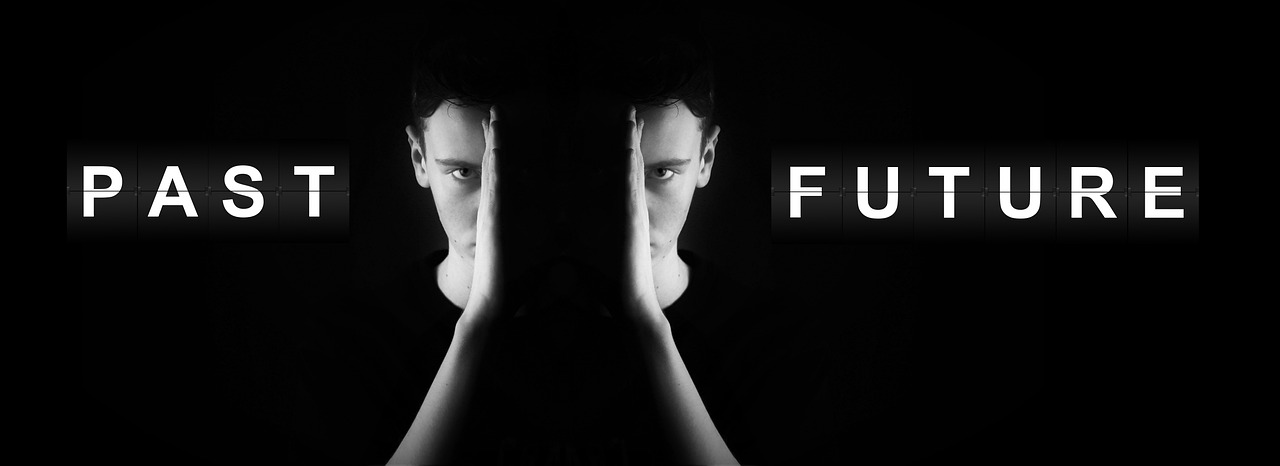
Legacy of Hobbes and Locke
The legacies of Thomas Hobbes and John Locke are not just historical footnotes; they are the very bedrock upon which modern political thought stands. Their contrasting views on human nature and governance have sparked endless debates and discussions, shaping how we perceive authority and individual rights today. It's fascinating to consider how their ideas have permeated various aspects of our political systems, influencing everything from the formation of governments to the development of legal frameworks.
Hobbes' notion of a powerful sovereign as a necessary evil to prevent chaos resonates in many authoritarian regimes around the world. His assertion that humans are naturally self-interested has been used to justify strong central authorities. In stark contrast, Locke's emphasis on the importance of individual rights and government by consent has laid the groundwork for modern democracies. His belief that people are rational beings capable of cooperation has inspired movements advocating for civil liberties and human rights.
To illustrate the impact of these philosophers, consider the following table that summarizes their key contributions and the resulting implications for modern political thought:
| Philosopher | Key Beliefs | Modern Implications |
|---|---|---|
| Thomas Hobbes |
|
|
| John Locke |
|
|
Moreover, the influence of Hobbes and Locke extends beyond political theory into the realm of legal systems and international law. For instance, Locke's ideas about property rights and the social contract have been instrumental in shaping property laws and the concept of governance based on consent. This has been pivotal in the establishment of modern legal systems that prioritize individual rights and freedoms. On the other hand, Hobbes' views have led to discussions about the limits of government power and the necessity of law and order in maintaining societal stability.
In essence, the legacies of Hobbes and Locke are deeply embedded in the fabric of our political discourse. Their contrasting philosophies continue to inspire debates about the role of government, the nature of human rights, and the balance between security and liberty. As we navigate the complexities of contemporary governance, it is essential to reflect on their insights and how they can inform our understanding of authority and individual freedoms in a rapidly changing world.
- What are the main differences between Hobbes and Locke?
Hobbes believed in a strong, absolute authority to prevent chaos, while Locke advocated for a government that protects individual rights and is based on consent. - How do Hobbes and Locke influence modern political thought?
Hobbes' ideas support authoritarian governance, while Locke's principles underpin democratic systems and human rights advocacy. - Why is the social contract important?
The social contract is crucial as it outlines the relationship between individuals and the state, defining the expectations and responsibilities of both parties.
Frequently Asked Questions
- What are the main differences between Hobbes and Locke's views on human nature?
Hobbes viewed human nature as inherently selfish and brutish, suggesting that a strong sovereign is necessary to maintain order. In contrast, Locke believed that humans are rational and capable of cooperation, advocating for a government that protects individual rights and promotes the common good.
- How does the social contract theory differ between Hobbes and Locke?
Hobbes' social contract theory posits that individuals surrender their rights to an absolute sovereign in exchange for security and order. Locke's version, however, emphasizes that government derives its power from the consent of the governed, prioritizing the protection of life, liberty, and property.
- What is the justification for absolute authority in Hobbes' philosophy?
Hobbes justified absolute authority by arguing that without a strong ruler, society would descend into chaos and violence. He believed that surrendering certain freedoms is a necessary compromise for achieving peace and order.
- What are the implications of Hobbesian governance?
The implications of Hobbesian governance include limited personal freedoms and a greater emphasis on security over individual liberties. This raises important questions about the balance between maintaining order and respecting individual rights.
- How do Hobbes and Locke influence modern political thought?
Both philosophers have profoundly impacted contemporary political theory, shaping discussions around democracy, individual rights, and the role of government. Their ideas continue to resonate in modern political discourse, highlighting their enduring relevance.
- What is the legacy of Hobbes and Locke in today's political systems?
The legacies of Hobbes and Locke are evident in modern political systems, where their ideas form the foundation for discussions on authority, governance, and human rights. Their contrasting views continue to inform debates about the nature of power and individual freedoms.





